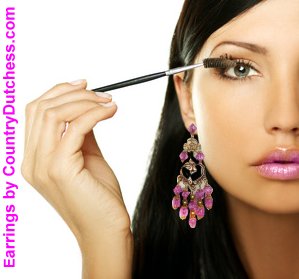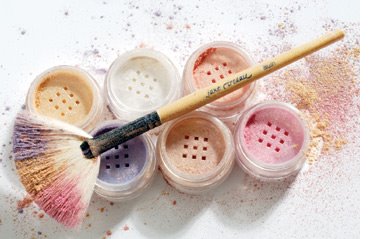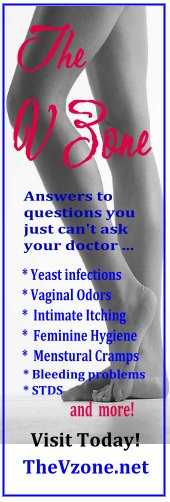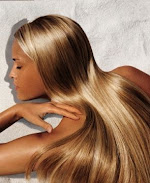 It was recently announced that the FDA and the EPA will be taking a closer look at health dangers linked to chemicals commonly found in hand sanitizers, anti bacterial soaps and more! RedDressDiary offers up the latest findings – plus gives you a look at some powerful all natural anti-bacterials that protect without health concerns.
It was recently announced that the FDA and the EPA will be taking a closer look at health dangers linked to chemicals commonly found in hand sanitizers, anti bacterial soaps and more! RedDressDiary offers up the latest findings – plus gives you a look at some powerful all natural anti-bacterials that protect without health concerns.
By Colette Bouchez
To be perfectly honest I was never a big fan of anti-bacterial products. I mean really, who needs all those chemicals when good old fashioned hot water and soap seemed just fine.
But that philosophy recently changed when a family member contracted a highly contagious bacterial eye infection – and the doctor advised taking additional steps to protect against transmission, including using hand sanitizers and antibacterial soaps.
Of course my first choice was to just go to a hotel - I mean who needs anti bacterial soap when you can have room service, right? :)
But budgetary concerns (and the need for a new washing machine) taking precedent, I went directly to Plan B – which was to locate the least offensive antibacterial line of products I could find. And what an eye-opening experience that turned out to be. Why?
First, I discovered that nearly every anti-bacterial product on the market contained just one basic chemical ingredient: triclosan. Secondly – I was astounded by the number of health concerns linked to this one ingredient!
What kind of concerns? According to the Environmental Working Group’s database of hazardous chemicals, studies on triclosan found links to cancer, allergies, immuno- toxicities, irritation of the skin, eyes and lungs, as well as having a host of developmental and reproductive toxicity issues. Also know as a “hormone disruptor” there is some concern that triclosan may, in fact, be especially bad for anyone dealing with breast or endometrial cancer - both of which have hormonal components - or to any couple trying to conceive.
In fact, researching just a little deeper I also discovered that triclosan is actually a pesticide closely related to dioxin – a known chemical health threat, endocrine disruptor, and carcinogen. According to the FDA, triclosan “could be” and is “suspected to be “ contaminated with dioxins!
What’s more, I also discovered the European Union classifies triclosan as dangerous to the environment while both the Canadian and Japanese governments have banned its use in cosmetics.
WAIT A MINUTE ….it’s in cosmetics? I thought we were talking soaps and hand sanitizers?
Indeed, yet one more eye-opener: Not only does triclosan dominate the antibacterial product market, it’s also in a ton-o-products that don’t even whisper it’s name on the label.
You can, in fact, find triclosan in not only many cosmetics, but also in soaps, dishwashing detergents, toothpastes, shampoos, skin creams and moisturizers, shaving gels, kids toys, workout clothes, and socks, to name a few! ( See full product list here). And because of this, it’s also found its way into our environment.
According to Rep. Edward J. Markey (D-Mass.), who has been pushing federal regulators to take stronger action to restrict the use of triclosan and other chemicals, “ It’s in our drinking water, it's in our rivers and as a result, it's in our bodies. . . . I don't think a lot of additional data has to be collected in order to make the simple decisions about children's toys and soaps that people use. It clearly is something that creates a danger,” he recently told The Washington Post.
Indeed, the exposure to triclosan is now so great that the US Centers for Disease Control and Prevention report that residues are showing up in the urine of 75% of Americans.
That said, Brian Sansoni of the Soap and Detergent Association,which represents the 30 billion US cleaning products industry recently said in an interview that concerns about triclosan are unfounded.
In a quote to the Washington Post he added " These products and ingredients have been reviewed, regulated and researched for decades," and he added that " science strongly supports the safety and efficacy of these products." He also said that the time was not only right for these products, but that they were necessary to protect us in a time of increased threats from disease.
Kinder, Gentler, Anti Bacterial Protection: It's Here Now!
Currently, both the FDA and The Environmental Protection Agency have agreed to take a second, much harder look at triclosan, including whether or not it could be causing us harm. But as anyone who has ever waited for a government report can tell you, answers are not likely to affect what’s on supermarket shelves any time soon.
So what’s a girl to do in the meantime ? First, remember that studies also show that vigorous hand washing for 20 seconds or more with regular old soap and hot water will go a long way in wiping out most germs destined to do us in.
But if you’re looking for an extra edge of protection, I’m happy to report there are kinder, safer natural antibacterial products available! In fact, one of the single most powerful anti bacterial ingredients available today is an all natural oil known as thyme that alone, or most often in combination with a series of other essential oils can provide the same (or better) protection as triclosan, without the inherent dangers.
Moreover, these same oils have been shown in independent laboratory studies to kill the “ bad” bacteria ( including MRSA, salmonella and E-coli) without destroying the “good” bacteria on skin that is designed to keep us healthy.
According to Dr. Larry Weiss, the medical director of CleanWell, one such company to use a combination of thyme and other natural oils, (and no triclosan) in all their antibacterial products, “ The good bacteria on our hands and skin helps us stay healthy by protecting against bad germs we’re exposed to through contact; that’s why it’s important to choose soaps and hand sanitizers that help your body maintain a healthy balance of bacteria.”
But are these natural, “balanced” products as good as the chemical guns in killing off those bad germs? The answer is yes.
- In the case of Cleanwell, the natural oils have been tested in independent laboratories using methods approved by the EPA and FDA.
- In the all- natural anti-bacterial soap “DEFENSE”, a combination of tea tree oil and oil of Eucalyptus, claims clinical effectiveness against bacteria associated with MRSA, ringworm, staph, impetigo, herpes, jock itch and athletes foot, and provides data on the ability to kill E-coli bacteria on contact.
- California Baby also offers up a natural antibacterial wash for both children and adults. It relies on lemon, tea tree oil and ravensara for natural antibacterial properties along with a recommendation to “vigorously “ wash your hands for 20 seconds or more for the best protection.
Ultimately, I chose the Cleanwell line of products.First because I was able to purchase them at a local drug store for under $5.00. But also because I believe they had the most impressive clinical testing record and evidence of effectiveness - and because they were also food safe. Which meant I could use them on my kitchen counters and even to wash dishes during critical times, as well as safely use the sprays and hand sanitizers when dining out and around kids and pets. I also found the scents to be the most pleasant, particularly the Spearmint Lime and the Ginger Begamot. And while I can't say for sure if the Cleanwell products helped cut down transmission during our eye infection trauma, I can say that no one else in my family caught it - so that was a relief!
In the end we may not be able to do much to avoid triclosan and other chemicals we don’t know are in the products we use. But at least we can feel pretty good about being able to intelligently choose the products we do use - and give ourselves and our families some protection from harm.
To learn more about the hidden sources and products containing Triclosan , click here . To find out more about all natural anti bacterial products click here.
To learn more about health, beauty and style for women over 40 visit RedDressDiary.com - your source for fabulous over 40! Or visit CheapChicDiary.com for money saving tips and advice on beauty and fashion for women of all ages!
Copyright by ElleMedia Network 2010 - All Rights Reserved.In addition to US Copyright, the text of this RedDressDiary article is licensed under a Creative Commons Attribution-ShareAlike 3.0 License. All formatting and style elements of this page are not available under this license, and Colette Bouchez retains all rights in those elements. Any products mentioned in RedDressDiary or CheapChicDiary may or may not have provided samples for review and testing. Clicking on any link in this blog may benefit the author.




































No comments:
Post a Comment